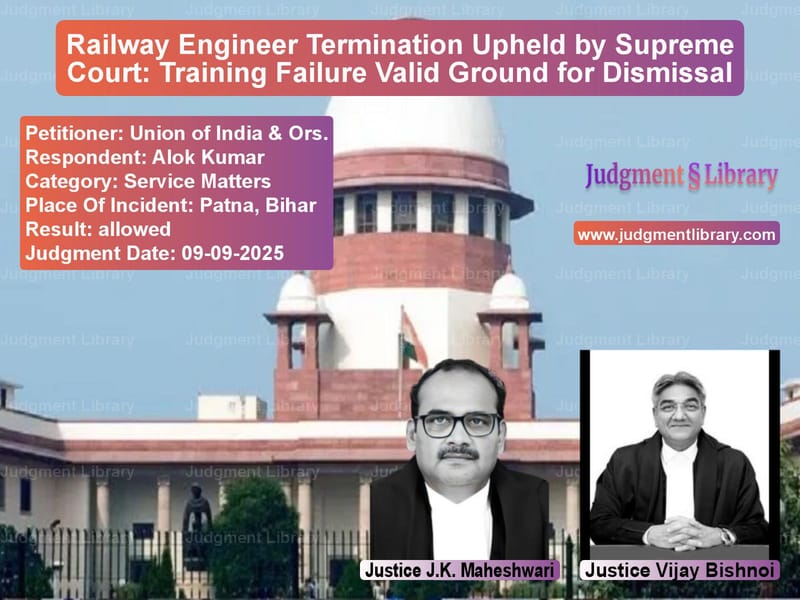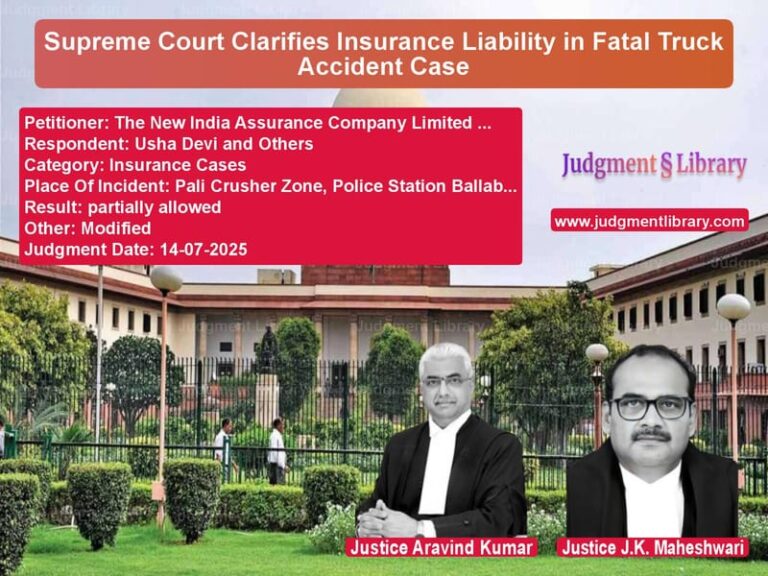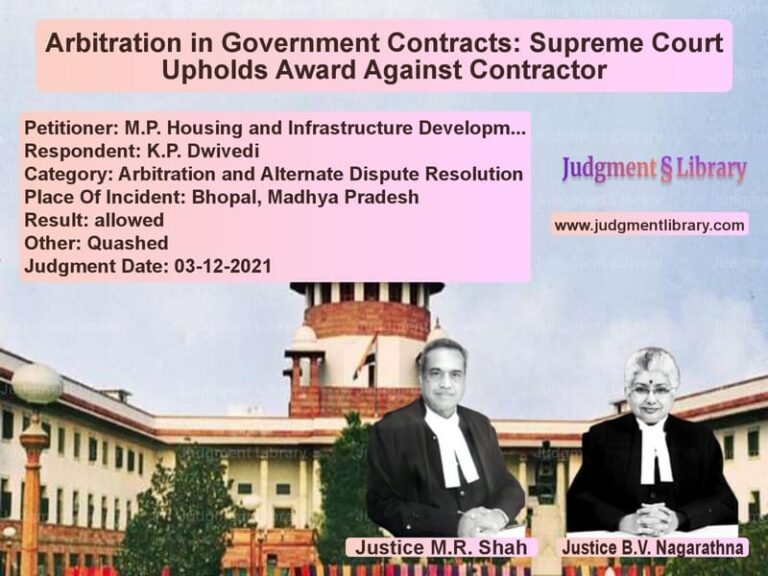Railway Engineer Termination Upheld by Supreme Court: Training Failure Valid Ground for Dismissal
In a significant ruling that clarifies the distinction between recruitment and appointment in government service, the Supreme Court has upheld the termination of a Senior Section Engineer trainee who repeatedly failed to clear mandatory training examinations. The judgment delivered on September 9, 2025, reinforces that successful completion of training is an essential prerequisite for permanent appointment in railway services.
The case involved Alok Kumar, who was provisionally appointed as a Senior Section Engineer trainee in the Railways but had his services terminated after failing to clear the General and Subsidiary Rules training examination twice. The legal battle spanned multiple judicial forums, ultimately reaching the Supreme Court where the Union of India challenged the Patna High Court’s decision that had reinstated Kumar.
The Recruitment Process and Training Requirements
The Railway Recruitment Board conducts recruitment for Group ‘C’ non-gazetted posts under the Master Circular dated June 28, 1991. This circular clearly establishes that “the initial period of training, wherever prescribed for non-gazetted direct recruits in various categories of Group ‘C’ posts, is an important pre-requisite to be successfully completed, before a trainee is absorbed in the post for which he has been recruited.”
More specifically, Clause 3 of the Master Circular mandates that “the qualifying examination at the end of initial training of directly recruited non-gazetted staff through the Railway Service Commissions (now Railway Recruitment Board) must necessarily be a written test.” The circular further warns that “candidates should be warned, at the time of their recruitment that their retention in service will be dependent on their successfully completing the training and passing the requisite test.”
For the position of Senior Section Engineer, the training duration was specified as 52 weeks in the Indian Railway Establishment Manual. The employment notice issued in 2014 clearly stated that “selected candidates will have to undergo training wherever training is prescribed for the post.”
Alok Kumar’s Case History
Alok Kumar successfully cleared the written examination conducted by the Railway Recruitment Board and received a provisional appointment letter dated September 14, 2016. The letter specifically stated: “You will be on probation for a period of 02 (two) years. If your performance in the field of training during probation period is found unsatisfactory, your service is liable to be terminated.”
After completing 46 weeks of his training, Kumar was sent to the Zonal Rail Training Institute in Muzaffarpur for a three-week General and Subsidiary Rules training from November 7 to 27, 2017. When the examination was conducted after this training, Kumar failed while two other trainees who attended with him cleared the examination successfully.
As per railway rules, candidates from General and OBC categories who fail such examinations in the first attempt can be given a second chance without stipend. Kumar requested and was granted this second opportunity, undergoing training from March 6 to 26, 2018. Unfortunately, he failed the examination again, while 31 out of 34 other trainees succeeded.
Consequently, his services were terminated on January 4, 2019, and he was directed to refund the stipend amount of ₹1,53,354 that had been paid to him during his second training attempt due to administrative error.
Legal Journey Through Judicial Forums
Kumar challenged his termination before the Central Administrative Tribunal in Patna, alleging discrimination. He claimed that four other trainees – Rohit Raj, Narendra Meena, Navneet Kumar and Nawal Kishore Jaiswal – had been granted permanent posting after completing only 46 weeks of training without undergoing G&SR training.
The CAT dismissed his application, observing that “two other trainees, apart from the Respondent, who had been allotted to the Construction Organization, were also sent for training at ZRTI. Accordingly, it could not be accepted that the Respondent alone was chosen for a special punitive training.” The tribunal also noted that Kumar had tried to mislead it by repeatedly referring to completion of “Field Training” as mandatory, while his appointment letter actually referred to performance in the “Field of Training.”
When Kumar approached the Patna High Court, it framed the core issue as “whether the petitioner is required to pass any prescribed departmental examination for the post of Senior Section Engineer or not?” The High Court ultimately allowed Kumar’s petition, setting aside the termination orders and directing the railways to reinstate him with all service and monetary benefits.
Supreme Court Proceedings
The Union of India appealed to the Supreme Court, represented by Ms. Poornima Singh, who argued vigorously for restoring the termination. She contended that “from a combined reading of the provisions of the Master Circular, the Employment Notice and the provisional appointment letter, it is apparent that after completion of training, every selected candidate is required to undertake an examination to ascertain whether he/she has successfully completed the training or not.”
Ms. Singh emphasized that “it is not in dispute that the Respondent had failed to clear the G&SR training despite being provided two chances, and therefore, there was no illegality in terminating his services as per the provisions of the Master Circular governing the field.” She also clarified that “departmental examinations are conducted only for the purpose of promotions and not for the purpose of recruitment/appointment,” distinguishing between training examinations and departmental examinations.
Regarding the recovery of stipend, she submitted that “while giving a second chance to the Respondent to clear the G&SR training, it was clarified that the Respondent will not be entitled to any stipend but the same was paid to him during the second training due to administrative inadvertence.”
Representing Alok Kumar, Mr. Amit Sharma argued that the High Court had correctly intervened. He contended that “the Appellants illegally terminated the services of the Respondent, despite him having successfully completed 46 weeks of training.” He maintained that “although he had failed to clear the G&SR training, but the fact remained that four other candidates, who were selected with the Respondent, were never sent to undergo the G&SR training and were directly appointed only after completion of 46 weeks of training.”
Mr. Sharma vehemently argued that “the termination order dated 04.01.2019 was highly discriminatory, arbitrary and violative of Articles 14 and 16 of the Constitution and had rightly been set aside by the High Court.” He also challenged the applicability of the Master Circular, suggesting it only applied “to those non-gazetted direct recruits in various categories of Group ‘C’ posts, for whom no specific training module existed.”
Supreme Court’s Analysis and Decision
The Supreme Court bench comprising Justices J.K. Maheshwari and Vijay Bishnoi conducted a thorough analysis of the facts and legal provisions. The court noted several crucial undisputed facts: the Master Circular governing recruitment required successful training completion; the employment notice warned about mandatory training; the appointment letter specified termination for unsatisfactory training performance; and Kumar had indeed failed the G&SR examination twice.
The court made a significant distinction between recruitment and appointment, citing its earlier judgment in Prafulla Kumar Swain v. Prakash Chandra Misra: “The term ‘recruitment’ connotes and clearly signifies enlistment, acceptance, selection or approval for appointment. Certainly, this is not actual appointment or posting in service. In contradistinction the word ‘appointment’ means an actual act of posting a person to a particular office. Recruitment is just an initial process. That may lead to eventual appointment in the service. But, that cannot tantamount to an appointment.”
Regarding the discrimination allegation, the court found that “all the three trainees, regarding whom the Respondent had sought information through RTI, had completed the 52-week training period before being permanently appointed to the post of SSE.” The court also noted that Kumar wasn’t singled out for the G&SR training, as several other candidates underwent the same training and most of them passed the examination.
The court firmly stated: “We are of the firm view that when the Respondent had failed to clear the G&SR training twice and as such, had failed to successfully complete the 52-week initial training programme, the Appellants have not committed any illegality in terminating the services of the Respondent, pursuant to the procedure prescribed for the purpose of permanent appointment of SSEs.”
However, showing some leniency, the court rejected the railways’ demand for recovery of the stipend amount, noting that “it is not the case of the Appellants that the stipend amount was paid to the Respondent due to misrepresentation or fraud, and therefore, we are of the view that in the peculiar circumstances of this case, the said demand raised by the Appellants against the Respondent for the recovery of the stipend cannot be justified.”
The Supreme Court’s judgment reinforces that government recruitment processes have well-defined stages and requirements, and successful completion of training is not merely a formality but an essential condition for permanent appointment. The ruling provides important clarity on the legal distinction between recruitment and appointment, and establishes that failure to meet training requirements constitutes valid grounds for termination of provisional appointments.
Petitioner Name: Union of India & Ors..Respondent Name: Alok Kumar.Judgment By: Justice J.K. Maheshwari, Justice Vijay Bishnoi.Place Of Incident: Patna, Bihar.Judgment Date: 09-09-2025.Result: allowed.
Don’t miss out on the full details! Download the complete judgment in PDF format below and gain valuable insights instantly!
Download Judgment: union-of-india-&-ors-vs-alok-kumar-supreme-court-of-india-judgment-dated-09-09-2025.pdf
Directly Download Judgment: Directly download this Judgment
See all petitions in Employment Disputes
See all petitions in Termination Cases
See all petitions in Recruitment Policies
See all petitions in Public Sector Employees
See all petitions in Contractual Employment
See all petitions in Judgment by J.K. Maheshwari
See all petitions in Judgment by Vijay Bishnoi
See all petitions in allowed
See all petitions in supreme court of India judgments September 2025
See all petitions in 2025 judgments
See all posts in Service Matters Category
See all allowed petitions in Service Matters Category
See all Dismissed petitions in Service Matters Category
See all partially allowed petitions in Service Matters Category







